MedTracks Research - NHS Highland
Mark Brill 1, Gordon Anderson 2 Andrew Gibson3
1 University for The Creative Arts and Memory Tracks Ltd 2 Memory Tracks Ltd 3 NHS Highland
Abstract
Background: MedTracks is a mobile application developed by Memory Tracks Ltd. that uses memorable music as reminders to support medication adherence. Following an initial trial, Memory Tracks was awarded Innovate UK SBRI funding to conduct a study with NHS Highland.
Aim: The objective of this study was to assess the feasibility of the proposed solution with target users, volunteers in the 40+ age groups with prescribed medication for conditions that can result in a higher risk of developing dementia, with the aim of identifying a significant improvement in medication adherence. Improved adherence can potentially positively impact health and enhance chances of avoiding or slowing the progression of dementia.
Methods: The study actively involved patients (n=31, volunteers aged over 40, with conditions linked to higher risk factors of developing dementia) from the target user group in the Scottish Highlands, using the MedTracks smartphone app. Participants were identified through advertisements and GP surgeries in the Scottish Highlands who were screened, informed, and consented. They participated directly in testing the app's feasibility and impact by using it for 30 days and providing feedback through quantitative questionnaires (MARS10, SUS) and qualitative interviews (n=14). Quantitative measures included the Medication Adherence Rating Scale (MARS10), measured on day 0 and day 29, and the System Usability Scale (SUS). Qualitative data was gathered through baseline and feedback questionnaires and selected semi-structured interviews conducted over Zoom after the 30-day trial.
Outcomes/Results: Quantitative results from MARS10 showed demonstrates a statistically significant change and is in the context of a cohort with prior good adherence. Specifically, the 14.5% decrease in missed dosages and 13.2% decrease in forgetting to take medication demonstrate the benefits of this intervention. Qualitative study also highlighted strong positive responses to the use of music, with on-screen notifications were seen by 89% of respondents and 67% hearing the song clip to as a medication reminder. Overall, the use of music was well-received and seen as more engaging than standard alarms.
The study demonstrated the potential of the MedTracks app to significantly improve medication adherence in a target user group. While the core functions and the music-based notification were positively received and supported adherence, the results highlight a need for further development of the user interface and experience. The findings further support the positive benefits of memorable music in medication adherence.
The findings regarding medication adherence improvements are noted to be consistent with meta-analyses by Armitage et al. (2020), that medication reminder apps have a positive impact on adherence and the qualitative findings on musical cues as memory aids align with work by Derks-Dijkman et al (2024).
Introduction
MedTracks is a mobile application to schedule medication reminders that uses memorable music as the notification developed by Memory Tracks Ltd. Following an initial study, Memory Tracks were awarded InnovateUK SBRI funding to carry out a study with NHS Highlands. The aim of this test phase was to assess the feasibility of the proposed solution with target users, volunteers in over 40 age groups with prescribed medication for conditions linked to dementia. Improvement of adherence can positively impact current health and enhance chances of avoiding or slowing down the progression of dementia. Potential participants were identified through advertisements in GPs surgeries in Scottish Highlands. Applicants were screened, informed and consented to take part in the study.
Quantitative measures and qualitative surveys were conducted to measure the app's impact on medicine adherence with the aim of identifying a significant improvement.
Participation for individuals involved the use of the MedTracks app to remind them to take medications. Participants were required to install and use the app on a smartphone connected to internet, set up the time to take and dosage of medication and confirm the taking a medication. In addition, participants completed baseline and feedback questionnaires.
MedTracks combines a song-based notification platform and an app environment for managing medication alerts and providing performance reporting. The song-based push notifications play on the home screen of the user’s phone whether the app is open or not. Utilisation of memorable songs from a person's formative years engage multiple areas of the brain and create a positive response that breaks through resistance to taking action. These can also create moments of joy and shared responses with people around. Personalisation features, such as associating images with song notifications, were utilised to enhance engagement and encourage continued usage.
Background
Poor adherence to medication for chronic diseases has been shown to be a worldwide problem (WHO 2003). The implications for poor adherence to medication impact negatively on the burden of chronic health, increase the likelihood of poor outcomes and increased healthcare costs (WHO 2003). In the intervening years, work has been done to address this issue but non-adherence is still thought to contribute to poor healthcare outcomes and increased healthcare costs (Kim, Combs et al. 2019).
Although an early Cochrane review found that there was “no evidence that low adherence can be cured” (Haynes, McDonald et al. 2002), it pointed to the effects of improving adherence having a wide ranging impact. There is also evidence that prevalence in non-adherence tends to be worse in chronic conditions rather than for acute episodes (Cea-Calvo, Marin-Jimenez et al. 2020).
Interventions to improve adherence with face to face interactions have been shown to be successful although digital solutions also shown to have merit (Kim, Combs et al. 2019). There are many reasons for non-adherence of medication – these can be categorised as intentional and unintentional non-adherence (Furmedge, Stevenson et al. 2018). The most common reason for unintentional non-adherence being simply forgetting to take the medication. This is where reminder notifications and the use of memorable music could play a role.
In the UK and devolved nations, there are no national approaches to aids for improving medication compliance (Walters, Chakravorty et al. 2022) and there is little evidence for patient benefits for things like dosette boxes. A recent national census gave estimates of smartphone use for adults over 16 at 84% (ONS 2022). Increased smart phone availability is a worldwide phenomenon as is the growth of apps to facilitate adherence and there is some evidence of efficacy (Perez-Jover, Sala-Gonzalez et al. 2019). Evidence exists to show that electronic reminders via text do improve adherence (Kim, Combs et al. 2019).
Simple before and after studies have shown significant improvements in adherence with a high level of user satisfaction (Perez-Jover, Sala-Gonzalez et al. 2019). A key concept for building sustainable habits of adherence is the notion of building the routine over time (Mathur, Dhodapkar et al. 2022). Using technology to create individualised approaches seems to be a good avenue for future investigation.
Development of the MedTracks App
Memory Tracks Ltd is a UK based company that has been investigating and developing digital solutions that connect memorable music to support people living with dementia, ageing and wellbeing. The company has been conducting research since 2017 in collaboration with academic and not-for-profit partners. The initial application, Memory Tracks linked memorable songs to daily tasks or activities for people living with dementia, called Song Task Association. Utilising music in this context engages multiple areas of the brain creating positive responses, or autobiographical memories, which in turn encourage action (Janata, 2009). Early observations using the Memory Tracks app also demonstrated the potential of this approach (Cunningham and Brill et al, 2019). Further applications have included digital tools for Cognitive Stimuilation Therapy (Memory Matters, 2023) and anticipatory care (ACT, 2024). It was apparent early in the Memory Tracks study that Song Task Association could be applied for other health groups, such as people with ADHD or for more specific tasks, such as medication adherence.
This led to the proposal of MedTracks, with the objective to develop an innovative, disruptive digital solution to support medication adherence in individuals aged 40+[1] who are at risk of dementia. There is a a significant challenge with medication adherence across many different groups, particularly for multiple or more complex dosages. In partnership with NHS Highland and supported by the NHS Scotland Innovation Hub, the MedTracks team designed, tested, and iteratively refined a mobile app that leverages music-based cues to build medication routines and promote adherence. Figure 1 shows examples of the key functions of the app that includes setting up the medication details (left), the main medication schedule screen (centre) and the song selection screen (right).
To enhance the personal relevance and emotional impact of the reminders, MedTracks identifies songs from a curated database of Top 40 hits from 1960 to 2019. Users provide their year of birth, enabling the app to match them with tracks that were popular when they were aged 6-15. Rao et al (2021) discussed a ‘reminiscence bump’ arising from memorable music with a peak in adolescence, at 14-19 years. Our own observations from the Memory Tracks research (Cunningham et al, 2019) also suggests that ages from 6-15 are a life stage associated with heightened music-related memory formation. App users can then continue to use the suggested song, or select their own by decade or even a random selection from a button called ‘surprise me’.
The use of memorable music in MedTracks is designed to optimise the recall and motivational power of each reminder, with the aim of making medication-taking a more engaging and emotionally resonant experience.
[1] The age range initially had an upper age limite of 55, but was amended to no upper age limit in order to broaden the recruitment of the research cohort.
Utilising memorable music through a smartphone app to to aid medication adherence: A mixed methods cohort study
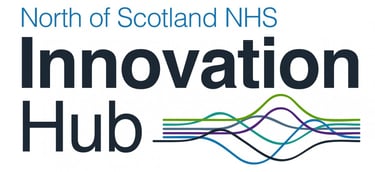

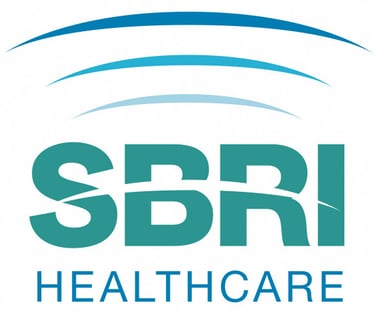

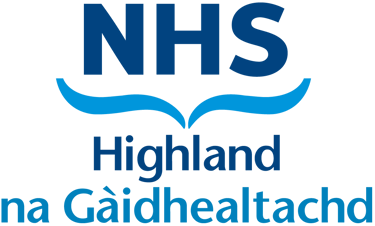

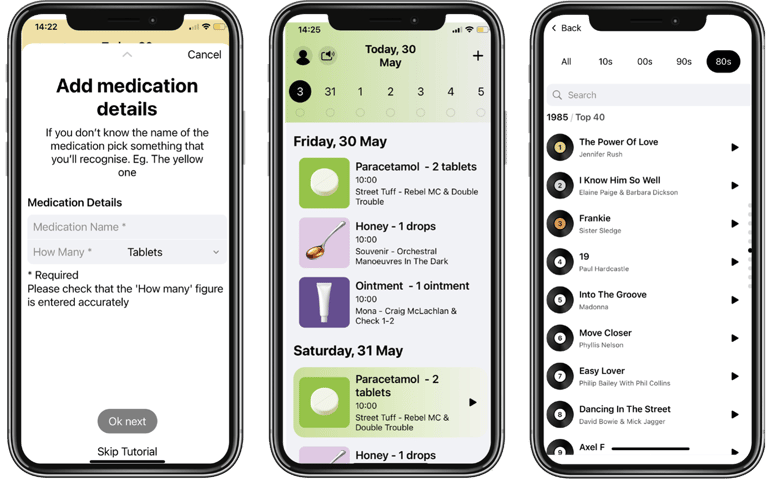

Figure 1
Feasability Study
Prior to this research, an initial small scale study (n=16) was carried out in 2024 in order to understand the feasibility of an app-based medication adherence study, alongside additional development of MedTrack’s user experience (UX). The feasibilty found that 62% of users noticed the music based notification and 37% reported the app had an impact ‘positive impact on taking medication more regularly’, with the remainder having no impact on the standard of care. In reponse to the UX, 50% reported that setting up reminders and customising the app easy or very easy. Whilst suggesting that the approach to the app was effective it also indicated improvements in the UX. Post study interviews (n=6) also proposed clearer help functions, “how to’s” whilst setting up the app and the a ‘snooze’ function to temporarily silence the music. The qualitative research also supported the use of music as a ‘mood booster’ in addition to the memorable music creating an ‘earworm’ as an ongoing reminder.
Ethics
The MedTracks study met the appropriate ethics through submission to NHS Integrated Resarch Ethics System (IRAS) and was passed via proportionate review, ID number 347639. No identifiable patient data was shared with the research team prior to informed self-referral.
As a low-risk, proof-of-concept study involving no changes to routine care, the project was deemed ethically sound with minimal risk to participants.
Methods
The outputs of this initial phase included the development of two functional prototypes (Alpha and Beta versions). The Alpha version was used in a field evaluation involving 31 participants aged 40+, with a median age of 69 (Figure 2), recruited through three GP practices in Inverness by NHS Highland’s Clinical Research Facility. Quantitative and qualitative data were collected using the MAR10 (Medication Adherence Report Scale), the System Usability Scale (SUS), and semi-structured interviews.
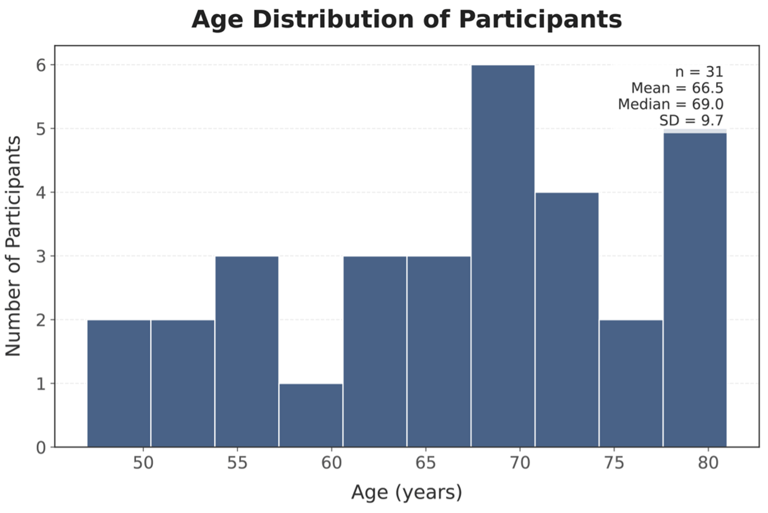

Figure 2
MARS 10
The survey utilised the 10 question Medication Adherence Rating Scale (MARS 10). Questions 1-4 related to medication adherence behavior, 5-8 covered attitudes toward taking medication and 9-10 considered negative side effects and attitudes to psychotropic medication. Participants completed the MARS10 questionnaire on day 0 and again on day 29 having used the MedTracks app for 30 days. Figure 3 shows a before and after comparison for the MARS10 scale.
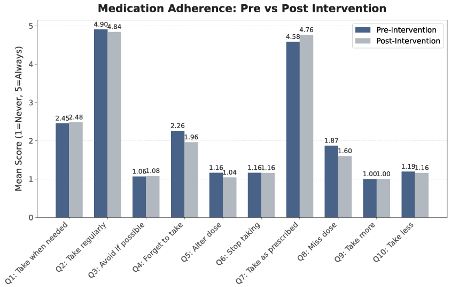

Figure 3
Notable changes whilst using the app were a decrease of 13.2% in respondents forgetting to take their mediation, a 10.4% improvement in adherence to the prescribed dosage and a 14.5% decrease in missed dosages (Figure 4). Q2 showed a small negative impact on regularly taking mediation, however given the cohort size and small percentage change we do not consider this to be statistically relevant.
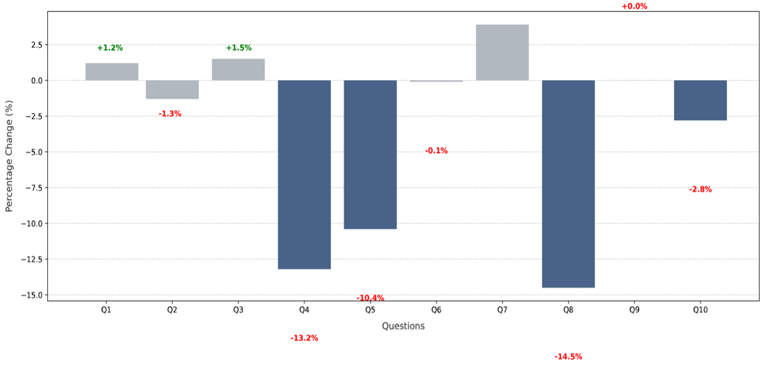

Figure 4
The change in Q4 (forgetting to take medication) shows a medium effect size (Cohen's d = -0.633), indicating a meaningful practical difference (Figure 5).
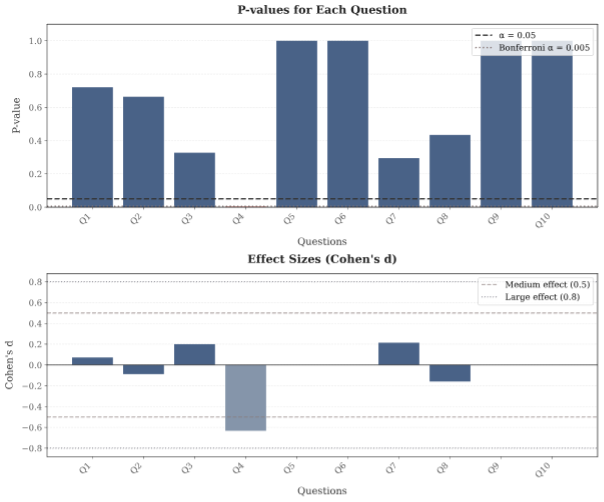

Figure 5
The improvements resulting from use of the MedTracks app is consistent with this analysis. In the context of MARS10, we observed that this cohort had a good level of medication adherence prior to using the app and therefore the improvement in key measures is significant and indicates the potential of MedTracks.
There were no statistically significant correlations of adherence in terms of age, gender or number of medications taken (Figure 6).
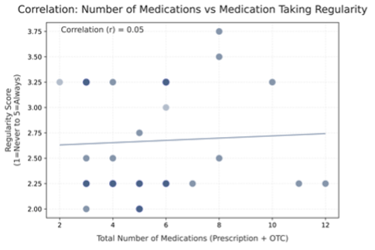

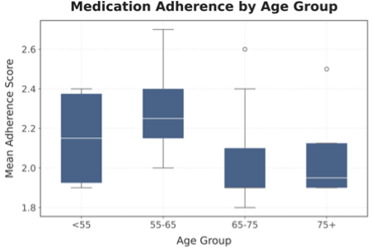

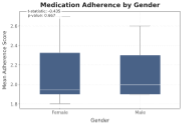

Figure 6
Usability
The performance the app was measured using a System Usability Scale (SUS) with 10 questions each using a Likert Scale scoring 1-5 (Figure 6)


Figure 7
The results are represented in a divergent scale that show some conflicting responses in terms of the usability. In particular, the quantative data suggested a need for good technical understanding or support in the initial use of the app. It is important to highlight that the app was provided in a testing mode that could not be downloaded directly from an app store as normal. The installation for this study required a more complex route either using an additional app, Test Flight, for iOS or a Google Drive link for Android users. For the latter, an incorrect link was initially sent to the participants which may have added some degree of frustration.
The SUS data suggest the need for greater clarity in using the app with 54% finding it awkward and 50% lacking confidence in using MedTracks. Conversely, the SUS data also found that only 20% of participants would not find the app useful. We can conclude that the core functions of MedTracks support improved medication adherence, but would benefit from further development of the user interface and experience.
There were some variance in SUS scores based on the phone type which may reflect small differences in the app design for the relevant operating system (Figure 8). There was a greater spread of scoring for iPhones (iOS), showing more positive results in specific areas. These could be considered for further developments of the MedTracks app.
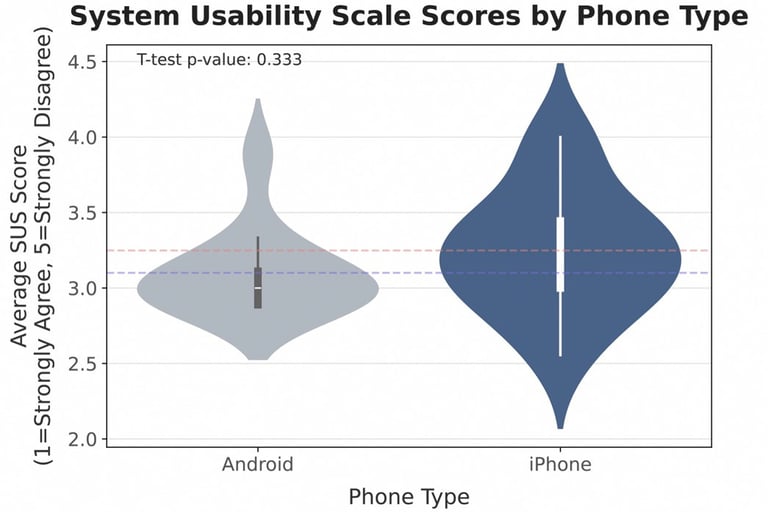

Figure 8
App Features
Figure 9 shows responses to the quantative study measuring the use of the app features. There were strong positive responses to seeing the on screen notifications (81%) and hearing the 30 second song clip at the same time (67%). These results are consistent with and support the MARS10 measures in terms of medication adherence.
There were also positive responses to customising settings, and initial app setup. Whilst these diverge from the SUS measures they are likely to reflect the more specific nature of these questions in relation to the MedTracks app.
42% of users had their phones on silent some or all of the time, which is consistent with more general reported usage of these devices. Some of the app functions were less used or not used at all These were confirming a mediation taken (50%), tracking these (56%) and the snooze function were not accessed by any participants as indicated in the top left of the bubble chart, Figure 10. The lack of usage of this function points to a need for clearer sign posting as the interviews suggested that these would beneficial for some users.
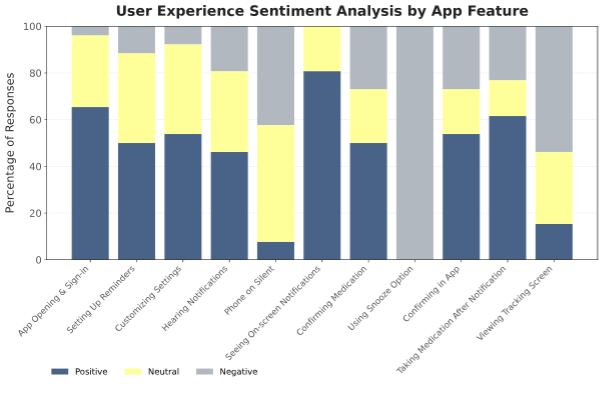

Figure 9
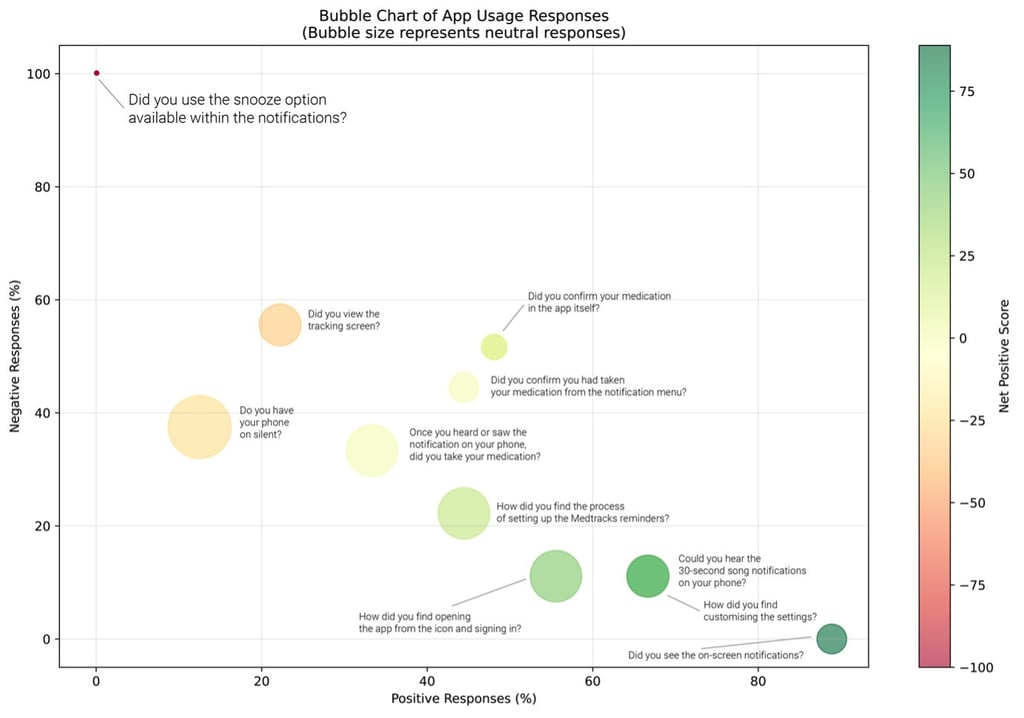

Figure 10
Qualitative Interviews
Following a 30-day trial of the app with participants recruited through NHS Highlands, selected semi-structured interviews (n-14) were carried out over Zoom and the voice recordings were transcribed by machine.
Theme 1: Previous Experience of medication adherence prior to using MedTracks
Participants used a few techniques to support adherence including routine, for daily medications, visual reminders through a numbered pill box and phone reminders for less frequent medications.
There were a range of medication adherence prior to participating in the study. Some reported being largely consistent with a daily routine, however participants also identified forgetfulness as a challenge with ageing. Some of the study group had used phone reminders for less frequent mediations. One participant relied on a very consistent routine and never forgot, while another used a 14-day pillbox but didn't strictly adhere to the day markings. The interviews suggested that time and frequency of medication had an impact on adherence. Daily medications tended to be easier to remember when at home, but more challenging when away from their normal routine. Similarly, when different medications were taken at different times in the day, participants found adherence more difficult. One participant also mentioned a health event impacting on their medication adherence.
Positive:
"On the whole, I'm pretty regular at taking them".
"For me, definitely, yeah. It's part of that very much embedded in that routine".
"Personally. No, at the moment, because I have this routine when, and I never forget to take them".
Negative:
"As you get older, you know the brain does stuff. Yes, I have forgotten at lunchtime, especially if I've been out".
"Trying trying to remember when to take things is it's quite. It's quite hard".
"Some of the medication has got the date on it, some don't. So I used to look back. It's just peace of mind". (This suggests a prior need for better tracking).
Theme 2: App Setup and Initial Use
There was a mixed response, more on the negative side, to installing and first use of the app. Some users found the installation process straight forward, especially after using provided instructions. However, others identified frustration installing MedTracks with issues such as difficulties downloading, due to incorrect links being issued and taking multiple attempts[1]. For some inputting detailed medication information was laborious. As this is not required by the system, some users opted for simpler entries like "morning tablets". One participant found the setup process took longer than anticipated.
There was also confusion regarding the music choice options. One user experimented with setting up multiple medications with different songs, leading to all playing simultaneously, which was deemed undesirable. Users who described themselves as tech-savvy could navigate issues, but also recognised that less experienced users might struggle. The initial tutorial was problematic for at least one user.
[1] It should be noted that the MedTracks was installed by users outside of the app stores for the purpose of this study. iOS users were required to install an additional app, TestFlight, and then install MedTracks through this. Android users were required to install the app via Google Drive, and for some, the link was corrupted when sent to participants.
Positive:
"I found the process of setting up the app worked really well, and you know I think there was instructions there that I could follow, and you know you could go, and, as you say, you could pick your own song...".
"Yeah, yeah, yeah, no problem". (Regarding setup being straightforward).
"I take, I take photos of the of the pills. Good. And that worked okay. And that that works fine. To be honest, I think that was pretty good".
Negative:
"The issue I had, which wasn't as straightforward, straight away was how to alter it. Right it is hi-tech. Edit it. Change it. Okay, now, that's a good point. Yeah, yeah. That was the only thing that I would say that took a wee bit of fiddling...".
"It took me a minute to work that one out". [Referring to understanding how to dismiss notifications initially].
"So for the first 2, I chose the same one. Okay. For the third one I chose something else, and for the fifth one I chose a 3rd thing. Right. But at no time did it ever play the 3rd one to me". [This quote relates to setup of multiple medications].
Theme 3: Awareness and Use of Notification Features
Awareness and use of the 'taken' and 'snooze' options within the notifications was low. Many participants did not notice these options and would often clear the notification unaware of the available actions. Some only became aware of these features later or by chance. One participant found the 'taken' option notification appeared for a very short time. However, some did notice and use the snooze function when it was inconvenient to take medication immediately. One participant found and used the 'taken' option from the notification, while another likely used it without realising. The lack of awareness highlights a need for better signposting of these features.
Positive:
"The drop down, it said, ‘taken’ if I pressed it".
"Yes, I always yes, you just click on it and push it to side". [Referring to dismissing the notification].
"See that I did see. Okay. That now you say the snooze, because I did snooze it a couple of times when, if I was out walking the dog or something".
Negative:
"No, I didn't notice that". [Regarding the 'Taken' option within the notification].
"I haven't noticed that, to tell you the truth.".
"But that notification to tap taken was there for a very short time... short time, so that if I was not in the room, I wouldn't be there to do it". [While the study participant did notice it eventually, the short duration limited its usability].
Theme 4: The Role and Perception of Music as a Reminder
The use of music as a reminder was generally well-received and seen as more engaging and enjoyable than standard phone notification. Participants liked the idea of music from their youth and the surprise element of random songs. Some found it made the task of taking medication less negative. For some, the music served as a simple trigger or reminder. However, the abrupt start and potentially loud volume of the music startled some users and even their pets. One participant experienced all set alarms playing simultaneously. While some focused on the trigger aspect and would stop the music quickly, others appreciated the element of fun and positive feelings evoked by the music. Derks-Dijkman et al (2024) examined how musical cues served as memory aids for older adults with cognitive impairment, that found personalised musical can show improved cognition. The responses in qualitative study are considered in the context of the qualitative data, there is a very strong indication to support the positive benefits of memorable music in medication adherence. During post Day 29 interviews the impact of songs as a reminder was the most mentioned and regarded as positive by 77% of users.
Positive:
"It is. It is a good reminder".
"For me it is, and for others. I could see that they might prefer just. An alarm the same all the time. But for me the music was. What's the fun? Bit?".
"I think it's great. I mean, I really enjoyed it... no, for me it was a it was quite nice, because otherwise you just get alarm bells, or you know something, you know. Which could be anything. But no, I did like the idea of the music".
Negative:
"Well, I thought, if I'm only having 10 seconds of it doesn't matter awfully much".
"I'm a bit hard of hearing, so I don't always hear the signal. Another room. I don't hear at all".
"But I'll just let it run if I'm here. I was in the pub, and I was in the bus going down to Glasgow on Thursday and going to a concert, and of course I forgot about the fact. You know Tx comes on Goodbye". (While the notification worked, the music wasn't always actively engaged with).
Theme 5: The emotional impact of memorable music
Memorable music had a positive emotional impact for several participants. There was recognition of the nostalgic benefit from the music. For some, it brought a smile, creating a positive association with taking medication. There was also a thought that recognisable tunes could be beneficial for individuals with dementia by triggering memories. There were no clear negative emotional impacts from the music itself, beyond sometimes not being heard or fully appreciated.
Positive:
"It brought a smile, you know and that's as important as anything else".
"It was nice to have that a supposed reminder of my youth... especially as perhaps it wasn't always music. I could have listen to leisurely, but it was reminders of of the past, so I find that that very good indeed".
"Every so often he'd hear it. And what's what... I could have a flashback". [Referring to a reminder song that was also their wedding dance song].
Negative:
"I wouldn't like to take a favourite song and think, Oh, God!". [Anticipated negative association with taking medication].
"It was actually it was quite disappointing. It didn't play for 30 seconds, because I know that's torture, isn't it? A couple of bars, and then it, you know". [Disappointment at the short duration limiting emotional connection].
Theme 6: App Functionality and Reliability
The app experienced some functionality and reliability issues. One user reported the app going "wonky" and not following the days correctly when offline, leading them to stop using it. Another user experienced double notifications for each medication, which was unsettling. There were also issues with the app potentially misreporting medication as taken. Some participants found the swiping action to mark medication as taken clunky and unreliable, sometimes causing the app to navigate to a different date. Difficulty updating medication status in the app after dismissing a notification was also reported. One user experienced a time delay in the app process. The app optimisation message appearing repeatedly was another functional annoyance.
Positive:
"I now know I've taken my medication, and that’s important. I'll keep on using it, because it does remind me".
"...it gives you peace of mind. You know, I know now that I've taken a tablet. I don't have to try and look at the box".
" I would go in [to the app] because right now I could probably go in and see. It's just half circle [showing 50% completed medication], because I've only taken a lot of medication. Yes, yes. But then I would go through, and I would have a look, maybe a week, to see whether I'd actually taken everything just to make sure that I'd used the app properly...". [The tracking circle was a positive function of the app].
Negative:
"The app started to go wonky... It wasn't online all the time. There... So it started to go Wonky, and there was different days in it, and such like this. It wasn't following the days...".
"My phone would not play the notifications for more than about 5 seconds, and I never really got that resolved". [While potentially phone-specific, it impacted app functionality for this user].
"The only thing was getting a tick box [to confirm a mediation had been taken] had to slide it a few times, you know, just to. Yes. But that's not a problem. No, I understand that I'm not so happy about that yet. That's that's a little bit tricky, isn't it?". [The swiping action was found to be unreliable].
Theme 7: Integration of the App into Existing Routines and Habits
Positive:
" You can look at any time and say, oh, I missed that, or I haven't missed that".
" I had it set for 10 o'clock. Yes. Okay. So that under all the circumstances I could think of, I would have taken my medication. Yes. By then...". (Setting a consistent reminder time to fit her flexible routine).
"I use the app as a reminder". [Fitting the app to their existing system of visual recognition via a pillbox].
Negative:
"But I'll just let it run if I'm here. I was in the pub... and of course I forgot about the fact [that they were supposed to take their medication]". [The app notification didn't always lead to immediate action within participants routine].
"So currently I have just displaying the warning or the notification not warning. And as a rule, I'm reading which song it was and then. Swiping it, cleaning it". [Using it more as a confirmation than an integrated prompt due to his radio listening].
"The process to take my 5 pills on the app took much longer than I would have anticipated... I deal with lots of people at CAB that have lots of medications, and for them they would be frustrated". [The interaction with the app for multiple medications was found to be a disruption for this participant].
Suggestions and Desires for App Improvement
Participants offered several suggestions for improving the MedTracks app. There was a strong consensus on the need for clearer signposting of features and more intuitive navigation. This was particularly the case with confirming and tracking taken medications. Simplifying the setup process and data input was suggested, possibly with predictive text for medication names. Some of these suggestions concur with existing plans for MedTracks that includes the clearer instructions, more intuitive navigation and signposting of specific functions. The team were aware of the question of how to manage notifications of multiple medications that are set to the same time. An aim of this study was to better understand how these might be presented in the app and we will now consider additional functionality to group medications into a combined reminder.
For the music feature, a gradual start to the sound was recommended. Some users desired a more comprehensive setup guide, especially for less tech-savvy users. While a detailed medication tracking screen wasn't universally desired, the ability to easily update medication status and understand if doses were missed was important. Integration with other music platforms like Spotify was also suggested. One participant proposed adding a feature to note reasons for not taking medication. The need for the app to be faster and more responsive was highlighted. Simplifying the overall complexity of the app was a recurring theme, perhaps allowing for a single alarm for multiple medications more easily. There was also an idea to develop a companion pillbox that plays the music.
Sentiment Analysis
A sentiment analysis from the interviews based on positive and negative mentions (Figure 11)
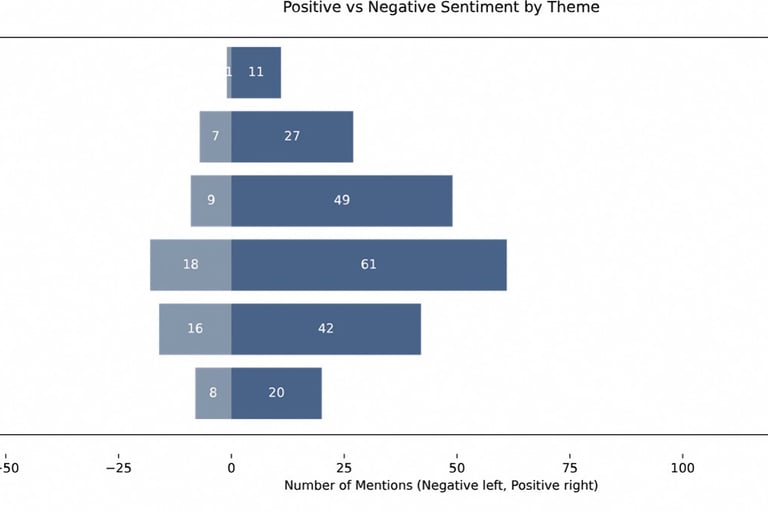

Figure 11
Key Findings from Interviews
The interviews point to the benefits of using music as a notification and most participants found that it had a positive impact on their medication routines. The way in which the app was set up by users and particularly the way in which music was used varied widely. Some users clearly benefitted from hearing memorable music and the associations it brings, whereas others found enjoyment from the ‘surprise me’ option with randomly selected music according to their year of birth. As a mobile application, there were a number of issues that can addressed:
- Installation: this process will be improved with the release of MedTracks into the app stores, but it is important to ensure that there is a clear and simple on-boarding process
- Setting up a medication reminder was generally straight forward, but MedTracks will need to consider how to allow users to manage multiple medications taken at the same time.
- There were mixed responses to inputting the medication information. It may be possible to include more automation of this in the future.
- Many users were not aware of the ‘tracking’ function to confirm that medications had been taken and particularly the option to do this from the notification on the home screen. This will need to be signposted more clearly in future versions of the app.
Conclusion
A meta-analysis by Armitage et al. (2020) identified an improvement using a medication reminder apps across a range of conditions showed modest but positive effects, with improvements ranging from 7-34% compared to standard care.
This study shows the potential of the MedTracks app to improve medication adherence in adults aged 40+, with the use of memorable music as an engaging reminder. Quantitative results showed notable improvements by reducing missed medications or dosages—significant outcomes given the cohort’s relatively high baseline adherence.
Qualitative feedback supported these findings, with participants highlighting the motivational and emotional value of music-based prompts. Many reported the music enhanced their routine, brought moments of joy and served as a more memorable cue than standard notifications. These outcomes align with existing evidence on the power of musical memory and its application in health interventions.
Challenges were identified with some of the app usability, such as difficulties in navigating features or confirming notifications, as well as managing multiple alarms at once. These findings point to the need for clearer instructions, improved interface design and function enhancements, such as grouped reminders and more flexible scheduling. It is expected that the development of a new mobile application will identify some user experience issues, however the study provides strong evidence for the feasibility and acceptability of using music as a digital intervention to support adherence. With further refinement and scaling, it has the potential to contribute meaningfully to long-term medication management strategies, especially for those at risk of cognitive decline.
Going forwards, the researchers would recommend broader studies to explore the effectiveness of memorable music and medication reminders with cohorts in other age groups and for different types of medications.
Bibliography
Armitage LC, Kassavou A, Sutton S. Do mobile device apps designed to support medication adherence demonstrate efficacy? A systematic review of randomised controlled trials, with meta-analysis. BMJ Open. 2020 Jan 30;10(1):e032045. doi: 10.1136/bmjopen-2019-032045. PMID: 32005778; PMCID: PMC7045248.
Cunningham, S., M. Brill, J. H. Whalley, R. Read, G. Anderson, S. Edwards and R. Picking (2019). Assessing wellbeing in people living with dementia using reminiscence music with a mobile app (Memory Tracks): A mixed methods cohort study. Journal of Healthcare Engineering
Cea-Calvo, L., I. Marin-Jimenez, J. de Toro, M. J. FusterRuizdeApodaca, G. Fernandez, N. Sanchez-vega and D. Orozco-Beltran (2020). Association between non-adherence behavious, patients' experience with healthcare and beliefs in medications: a survey of patients with different chronic conditions. Current Medical Research and Opinon 36(2): 293-300.
Derks-Dijkman, Marije W et al. (2024). Effects of musical mnemonics on working memory performance in cognitively unimpaired older adults and persons with amnestic mild cognitive impairment. Journal of neuropsychology vol. 18,2 286-299.
Haynes, R., H. P. McDonald, A. Garg and P. Montague (2002). Interventions for helping patients to follow prescriptions for medications (Review). Cochrane Database of Systematic Reviews 2002(2).
Jakubowski, K., Eerola, T., Tillmann, B., Perrin, F., & Heine, L. (2020). A Cross-Sectional Study of Reminiscence Bumps for Music-Related Memories in Adulthood. Music & Science, 3.
Janata P. (2009). The neural architecture of music-evoked autobiographical memories. Cereb Cortex. 2009 Nov;19(11):2579-94.
Kim, J., K. Combs, J. Downs and F. Tillman (2019). Medication adherence: The elephant in the room. US Pharmacist 43(1): 30-34.
Perez-Jover, V., M. Sala-Gonzalez, M. Guilabert and J. J. Mira (2019). Mobile Apps for increasing treatment adherence: Systematic review. Journal of Medical Internet Research 21(6).
Rao, C.B.; Peatfield, J.C.; McAdam, K. P. W. J.; Nunn, A.J. & Georgieva, D.P.; (2021); A Focus on the Reminiscence Bump to Personalize Music Playlists for Dementia, Journal of Multidisciplinary Healthcare, 14:, 2195-2204, DOI: 10.2147/JMDH.S312725
WHO (2003). Adherence to Long-Term Therapies - Evidence for Action. Geneva, WHO
Memory Tracks Ltd
Empowering care through music and technology.
Support
Connect
contact@memorytracks.co.uk
© 2025. All rights reserved.
